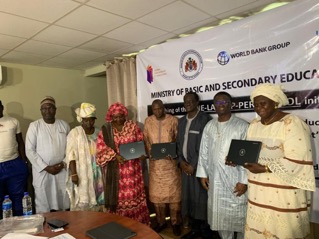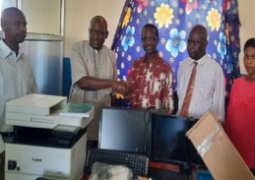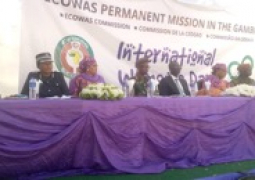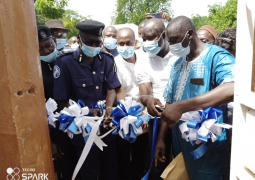
The launching ceremony which was held at the MoBSE, was presided over by the Minister for Higher Education who is currently overseeing the basic secondary education ministry.
The project, officials said, is supported by the government of The Gambia in collaboration with the Global Partnership for Education, (GPE), UNICEF, MRC-Holland and the World Bank Group.
The initiative, they further added, is also aimed at ensuring that each school manager has a laptop in order to promote efficiency in school administration. It is also expected to support school managers in managing their data and other important records.
In his launching statement, Professor Pierre Gomez, the Minister of Higher Education, Research, Science and Technology, said: “The initiative marks a significant step in our efforts to enhance quality education and empower school managers with the tools needed for efficient service delivery in the digital age.”
The One-Laptop-Per-School initiative, Minister Gomez added, is in-line with the Recovery Focused National Development Plan 2023-2027 dubbed “Yiriwaa” and the Education Sector Policy objectives 2016-2030 that seek to support the digital transformation of the education sector.
To achieve this transformation agenda, he said, “the Gambia Government aims to develop digitized information systems, increase the digitalization processes of public services - which includes the management of school information and expand the usage of the Electronic Records Management System (ERMS) across the Public Service.”
The Higher Education Minister further added: “The initiative is also designed to enhance and equip school administrators with a laptop, to improve their data management capabilities and digital literacy skills.”
The success of this initiative, he furthered, depends on the availability of energy as a critical infrastructure, saying: “Fortunately, the launching of this initiative coincides with the expansion of rural electrification and the on-going schools’ solarization project,” he claimed.
According to him, the project will also enhance data communication amongst the Ministry, Regional Education Directorates, and schools in order to ensure timely and accurate processing and reporting of data, adding: “The goal is also to create a more efficient and responsive education system that meets the needs of both students and educators.”
“This initiative also provides the basis for integrating education and health data to support individual child tracking systems and cross sectoral data sharing.”
Louise Moses Mendy, the ministry’s Permanent Secretary, spoke at length on the significance of the initiative, adding: “It also aims to better learning outcomes for every child in the country, which also aligns with their broader national effort to “Zero out-of-school children initiative.”
Gomez called for greater collaboration between school leaders, communities and partners, including UNICEF, EFA-Net, ChildFund and the Ministry of Health.
Aji Sohna Foon, the director of Planning at the MoBSE highlighted the significance of the initiative especially in terms of data driven decision-making.
Concluding, she said, the initiative will help to improve attendance, retention and performance and enhance data management at school level.





